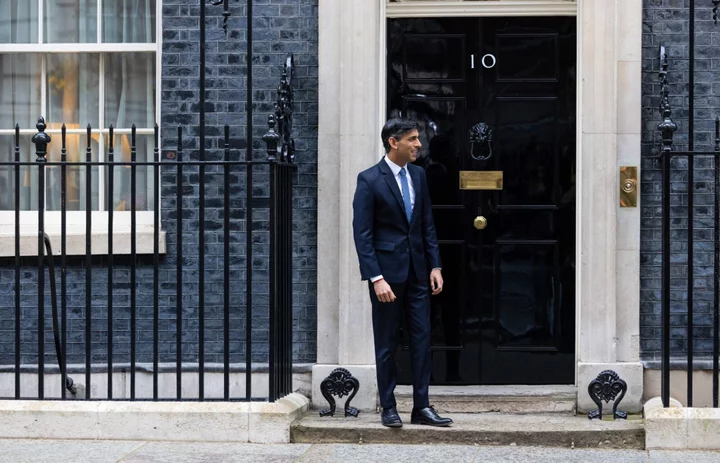Rishi Sunak faces an awkward three-week political test that is likely to have a lasting impact on his premiership and even his chances of upsetting the polls by winning the next UK general election.
Parliament goes on summer recess on July 20, the same day Sunak’s ruling Conservatives face elections in three parliamentary seats triggered by the resignation of Tory MPs. Good results would give the prime minister a major boost through the holiday and into a fall political season that will be critical to shifting predictions of a Tory loss in a national poll expected in 2024.
Read More: Sunak Shows Frustration as Torrid June Has UK Cabinet on Edge
Yet a strong Conservative performance would be against the recent trend, and there are other potential land mines for Sunak in the coming weeks.
A state visit by US President Joe Biden, doctors strikes that will hobble his key pledge to cut hospital waiting times, a predicted uptick in asylum seekers arriving from France on small boats and any political fallout from the financial concerns surrounding Britain’s biggest water supplier will go a long way toward shaping the mood of Tory MPs as they head back to their districts.
Trailing Keir Starmer’s opposition Labour Party by 22 points — a lead that has grown from 16 points in three weeks, according to YouGov — means Sunak is under pressure. He would have hoped that a long-awaited plan to boost staff members in the National Health Service, which he described as the “one of the most significant things” he will do as prime minister, would help turn the tide.
But his announcement was overshadowed on Friday when a minister resigned with a very public attack on the prime minister’s performance. It was the latest in a series of public Tory spats that have undermined Sunak’s attempt to build a united front to put to voters, from the fiery resignation of disgraced former leader Boris Johnson as an MP, to election campaign disagreements.
Against that backdrop, Biden’s visit during a July 9-13 trip to Europe to shore up NATO allies could be a welcome respite from a turbulent party. Relations with the White House have improved under Sunak, while talking up the UK’s record backing Ukraine against Russian aggression is catnip for restless Tories.
Still, there are risks for Sunak. On a trip to Belfast and Dublin in April, Biden made clear he’s concerned about the peace process in Northern Ireland and ensuring Brexit doesn’t undermine it. With the Democratic Unionist Party still refusing to rejoin the region’s devolved government, there is still a major issue for Sunak’s government to resolve.
Read More: Sunak’s Flagship Rwandan Deportation Policy Ruled Unlawful
Later that week, it appears virtually guaranteed the prime minister will face a slew of uncomfortable headlines when junior doctors in England begin five days of strikes on July 13 — the longest single walkout in NHS history. Polls show the public still supports striking health-care staff, despite months of industrial action across the public sector that have significantly hit services.
Sunak has made clear he regards tackling soaring inflation as his top economic priority and sees negotiations over public pay in that context. Health Secretary Steve Barclay told Sky News on Sunday the approach will not change, though the Times newspaper later cited him as saying there needed to be movement on both sides to end the strikes.
But NHS England chief executive Amanda Pritchard told the BBC that disruption from strikes had already been significant and the next round would exacerbate that. “We can’t let it become business as usual for the NHS,” she warned.
Read More: Sunak Vows Major NHS Recruitment in Bid to Win Back Voters
Sunak’s week gets off to a potentially tricky start on Tuesday, when he appears before Parliament’s powerful liaison committee. He is likely to face questions on issues including Thames Water, which ministers are considering nationalizing, and the implications for Sunak’s policy of deporting asylum seekers to Rwanda, which a court ruled last week was unlawful.
Yet the biggest political fireworks are likely to come with the by-elections.
The three votes on July 20 will be closely analyzed for evidence Sunak is improving the party’s chances, especially after its dismal showing in May’s local elections. Johnson’s former seat of Uxbridge and South Ruislip was regarded as a prime Labour target given the former prime minister’s tainted record. After he quit, it’s seen as more in the balance.
The district of Somerton and Frome in southwest England is expected to fall to the Liberal Democrats, who took nearby Tiverton and Honiton last year in similar circumstances when another disgraced Tory MP resigned. The third vote is in Selby and Ainsty, close to Sunak’s own district, after Johnson loyalist Nigel Adams quit in solidarity with the former Tory leader.
But it is a survey taken in Mid Bedfordshire, where Tory MP Nadine Dorries — another Johnson loyalist who announced her resignation but has yet to formally do so — that will likely worry the Tories. The Telegraph newspaper reported on Saturday that the poll by Opinium, which was commissioned by Labour, found the opposition party on course to win. If it happened, that would be the biggest upset in by-election history, according to the Telegraph.
Read More: Sunak Risks Failing on His Five Key UK Pledges at Halfway Point
Even the most anti-Sunak Tory MPs — mostly those still loyal to Johnson — concede the Conservatives can’t afford to change leader again, meaning Sunak is almost certain to take the Tories into the next general election. But the next three weeks could well shape the mood of the party he has to campaign with.

